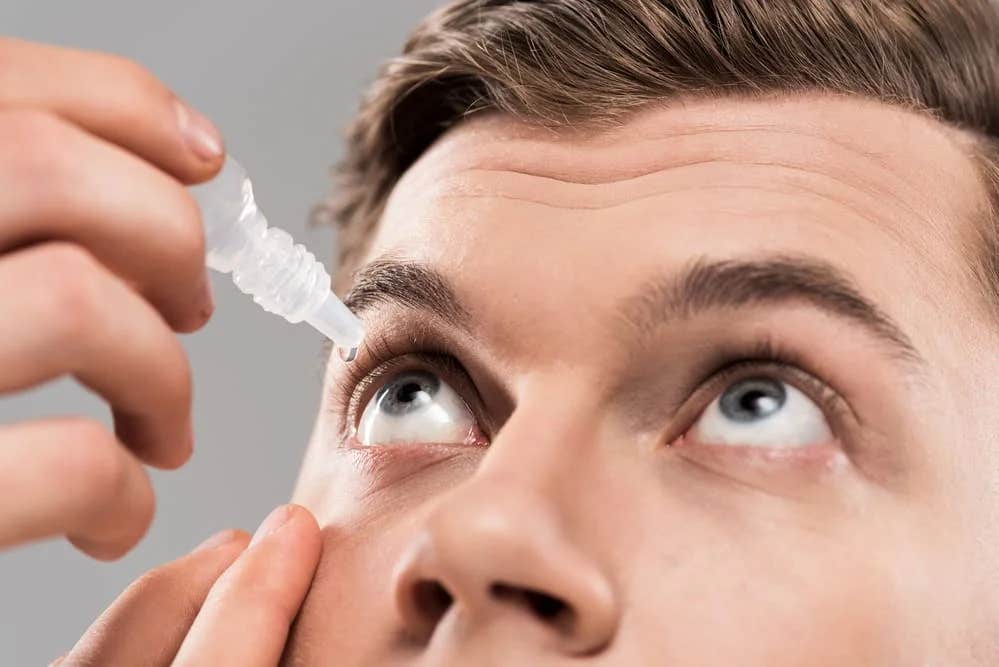A new prescription eye drop brings hope beyond reading glasses
With these drops, within 15 minutes, you can clearly see your phone, your computer, and improve your range of vision.

The drops are meant for people dealing with Presbyopia, an age-related eye issue that causes blurry vision. (CREDIT: CC BY-SA 3.0)
A new prescription eye drop has been approved that could make reaching for reading glasses less of a daily hassle. Called Vuity, the drop is designed to help people with presbyopia, the age-related condition that blurs close-up vision. It’s the first treatment of its kind cleared by the Food and Drug Administration, and eye specialists are calling it a milestone in eye care.
What Happens to Your Eyes with Presbyopia
As you grow older, usually past your forties, the clear lens inside your eye begins to stiffen. This makes it harder to switch focus from far objects to near ones. Reading a text, scanning a menu, or working on your computer can suddenly turn into a blur. Nearly everyone experiences this gradual change, and according to global estimates, more than 325 million people are living with presbyopia. That number is expected to keep rising over the next decade.
For years, reading glasses, bifocals, or contact lenses have been the most common fixes. Surgical options like LASIK or corneal inlays have also been used, though not everyone is a candidate. What’s been missing is a non-invasive, everyday solution that doesn’t require you to put on glasses every time you want to read. Vuity aims to fill that gap.
How Vuity Works
Vuity contains pilocarpine hydrochloride, a well-known compound that causes the pupil to shrink. When your pupil becomes smaller, it creates what’s called a “pinhole effect.” This increases the depth of focus, helping you see things up close more clearly without reducing your ability to see far away.
The drop is used once a day and begins working within about 15 minutes. Results last several hours. Dr. Ella Faktorovich, an ophthalmologist at Pacific Vision Institute, says the benefit is both practical and personal. “Reading glasses can be frustrating to keep track of,” she explains. “With these drops, within 15 minutes, you can clearly see your phone, your computer, and improve your range of vision.”
For many, that means better near vision during the hours when it’s needed most—at work, at dinner, or while reading a book—without having to fumble for glasses.
Related Stories
- New eye drops could replace reading glasses for millions
- Breakthrough eye drops reverse vision loss from age-related macular degeneration
Testing the Drops in Clinical Trials
Before winning FDA approval, Vuity was tested in two major Phase 3 clinical trials, GEMINI 1 and GEMINI 2. Together, they enrolled 750 adults between the ages of 40 and 55. Participants either received Vuity or a placebo drop once daily in each eye for 30 days.
The goal was straightforward: see if those using Vuity could read three extra lines on a standard reading chart in dim light, without losing much distance vision. The results were clear. By day 30, hour 3, both studies showed significant improvement for people who received the active drops.
Side effects were mild. The most common were headaches and eye redness, reported by fewer than 5% of participants. Importantly, no serious complications occurred. That safety record, combined with meaningful improvement in vision, convinced regulators to give the green light.
What Vuity Means for Everyday Life
The approval of Vuity doesn’t mean it’s right for everyone. Because it’s available only by prescription, an eye exam is necessary before starting. Some people, especially those with certain eye conditions or who need flawless near vision for detailed work, may not be ideal candidates.
Still, doctors see Vuity as a sign of what’s to come in eye care. Julie Schallhorn, Associate Professor of Ophthalmology at UCSF, says the approval opens the door for new ways to treat age-related vision changes. “The data we have shows that it really works,” she says. “It is an exciting time to be in this field, and an exciting time for our patients.”
Writers, office workers, and anyone who spends hours staring at screens may find the prospect especially appealing. Author Lovester Law describes how difficult long reading sessions can be. “After a long stretch of reading or writing, I just have to close my eyes and rest,” he explains. Drops that reduce that fatigue without glasses could be a game changer.
The Science Beneath the Solution
Vuity works by stimulating receptors in the muscles of the eye. This makes the iris contract, which in turn narrows the pupil. It also slightly shifts the lens into a position that favors near vision. The result is better focus for close work, while keeping enough flexibility to still see faraway objects.
The drop is delivered through a special technology that adapts to the eye’s natural pH quickly, helping the medicine work faster and more comfortably. That’s why results are noticeable in minutes rather than hours.
Understanding the Bigger Picture of Presbyopia
Presbyopia is not a disease but a natural change in the aging eye. The lens becomes thicker and less flexible due to structural changes in proteins, leaving you with less ability to adjust focus. The condition comes in different stages, from mild blur to more advanced loss of near vision.
Early symptoms often appear when you hold reading material farther away or squint more often in dim light. Headaches and eye strain after reading are also common signs. While presbyopia is almost universal with age, the experience varies. Some people develop symptoms earlier, while others notice them later in life.
Even with a new option like Vuity, sudden or dramatic vision changes still require urgent medical attention. Flashes of light, sudden blindness in one eye, or double vision may point to more serious problems unrelated to presbyopia.
Looking Ahead
Vuity is not a permanent cure, but it represents progress in vision care. By offering a daily, non-surgical option, it adds flexibility to how you manage aging eyes. The drop was developed by Allergan, now part of AbbVie, and is the first FDA-approved drug for presbyopia. Other similar treatments are still in testing, meaning more choices may soon follow.
For now, Vuity offers freedom from reading glasses for at least part of the day. For people who dislike switching between near and far lenses or who simply want a break from glasses, that freedom could make daily life smoother.
Note: Materials provided above by The Brighter Side of News. Content may be edited for style and length.
Like these kind of feel good stories? Get The Brighter Side of News' newsletter.



